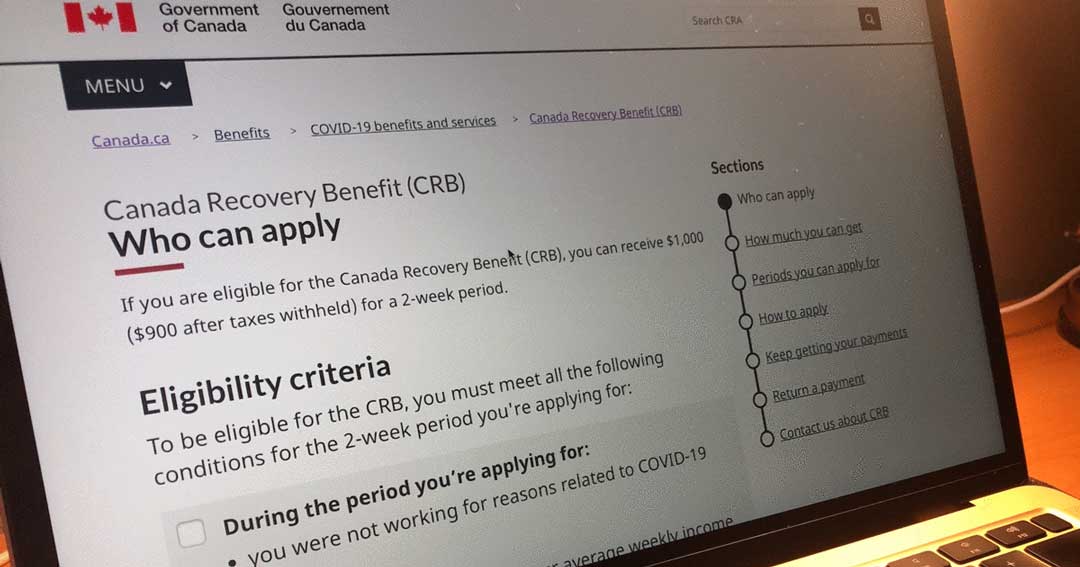
The Canada Revenue Agency (CRA) launched the Canada Emergency Response Benefit (CERB) as the flagship COVID-19 program by the Canadian government in 2020. CERB became a lifeline for Canadians who lost income due to the pandemic. The program ended on September 27, 2020, and made way for CERB replacements.
The federal government revamped the Employment Insurance (EI) system and introduced the Canada Recovery Benefit (CRB) to transition Canadians still in need of financial aid. With no visible end to the pandemic, despite hopeful developments on the vaccine front, the government announced two major updates for EI and CRB.
Maximum duration
Many CRB recipients are due to exhaust their benefits on March 27, 2021. The government’s announcement to update CRB and EI came right on time. One of the changes introduced by the CRA will be an extension of CRB from the original 26 weeks to 38 weeks. For regular EI benefits, the CRA has extended the period to 50 weeks for claims made between September 27, 2020, and September 25, 2021.
The federal government also extended the Canada Recovery Caregiving Benefit (CRCB) and Canada Recovery Sick Benefit (CRSB). The CRCB duration is also 36 weeks after the update, while the CRSB has been extended from two to four weeks.
CRA cash benefit amount
The CRA pays $1,000 for each two-week CRB eligibility period, which is actually $900 after the 10% withholding tax is deducted at the source. For self-employed individuals who prefer access to their EI benefits through Service Canada, the government has reduced the self-employed income threshold (for 2020 earnings) from $7,555 to $5,000.
You can earn income while you receive CRB, provided that your annual income for the calendar year will not go over $38,000. You will need to pay 50% of each dollar of your income that goes above $38,000.
If you qualify for the EI benefit, the minimum amount you can receive per week is $500 (subject to a 10% tax on payment), but some people may be eligible to receive up to $573 per week, depending on their previous income. The proceeds for both CRSB and CRCB are $450 per week (subject to a 10% withholding tax upon payment).
Source: CRA
Newsletters
e-Newsletter – January 2018
NewslettersEvents & SponsorshipArticles & Publications
Events & Sponsorship
No Results Found
The page you requested could not be found. Try refining your search, or use the navigation above to locate the post.
Articles & Publications
Moving to the U.S. for more affordable Real Estate
Moving to the U.S. for more affordable Real Estate? Home prices have run-up in the U.S. but are mostly more affordable than major Canadian markets. Like many real estate markets worldwide, U.S. home prices have run up during the pandemic to the point of some saying...
New Goods and Services/Harmonized Sales Tax Rules
This article intends to illustrate how the new proposed Goods and Services/Harmonized Sales Tax (GST/HST) rules are to apply to the sale of goods made on July 1, 2021, or later, by a retailer that is a non-resident of Canada and not registered for GST/HST purposes,...
When withdrawing funds early from your RRSP makes sense
Most Canadians spend their working lives socking away as much money as they can in their registered retirement savings plans (RRSPs) — often feeling guilty if they’re not maxing out the contribution limits set by the federal government. Once retirement rolls around,...
Understanding the CRA Notice of Assessment
Understanding the CRA Notice of Assessment How to object if you think the CRA is wrong Most of us have received our Notice of Assessment from the CRA for our 2020 tax returns. Mostly it is pretty much as you expected – a refund or no balance owing. But sometimes, the...
A Guide to Bank Reconciliations
One of the most overlooked steps in the accounting process is completing a bank reconciliation. We'll take you step-by-step through the process of completing bank reconciliations for your business. In this day of electronic banking, many people believe completing a...